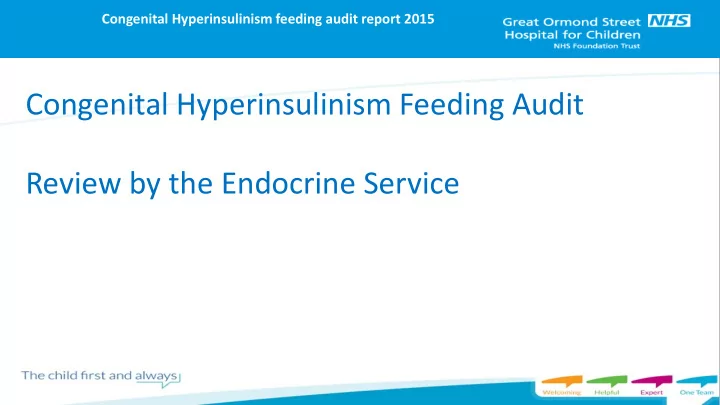

Congenital Hyperinsulinism feeding audit report 2015 Congenital Hyperinsulinism Feeding Audit Review by the Endocrine Service
Change of treatment since 2012 • Infants always offered trophic feeds on admission • Blood glucose levels stabilised using SC/IV Glucagon and/or SC Octreotide • IV glucose volume reduced and infants feeding established • Diazoxide only commenced once feeding established
Congenital Hyperinsulinism audit report 2015 Aim Standards To identify the number of patients The audit will look at the with CHI who have associated following factors: feeding difficulties. Patient feeding issues on admission and on discharge. To determine the level of parental Parental concerns. concern around feeding issues Interventions required from Speech and Language Where possible, to discharge each Department / Dietetics patient with normal glycaemic Department. control on a normal oral feeding plan of care.
Congenital Hyperinsulinism audit report 2015 Sample A consecutive sample of 12 patients with a diagnosis of CHI who were admitted to Great Ormond Street Hospital between January and October 2015 Methodology CNS team designed and completed paper based questionnaires for each patient included in the sample. Information was obtained from medical and nursing notes. We have compared results with our data from 2012
Results Presence of a feeding difficulty 8/12 patients with HI had some kind of feeding difficulty on admission Resolution of difficulty 76% (6/8) with a difficulty on admission were feeding orally or breast fed on discharge (c/w 54% (7/13) in 2012)
Results Parental Concern • Overall, 50% (6/12) of parents had concerns about feeding on admission of their child to Great Ormond Street (c/w 73% (11/15) in 2012 Concerns included: Not being able to breast feed Difficulty in feeding orally Vomiting on feeds • On discharge 8% (1/12) parents had concerns about feeding. (c/w 60% (9/15) in 2012) • 83% (5/6) of parents had concerns on admission but were not concerned about feeding at discharge • 8% (1/12) parents had concerns at discharge but not on admission (c.w 17% in 2012 2/15)
Results Patient discharge Mean length of stay for patients with CHI: 63 days (c/w 57 days in 2012) Range of the length of stay for patients with CHI: (8-222 days) (c/w – 5 days-314 days in 2012)) No patients had a delay in discharge (c/w 33% (5/15) in 2012) . Feeding issues were an identified reason for delay for 80% (4/5) of patients in 2012. No delays in 2015
Speech and Language Therapy/Dietetics • 100% (6/6 of) parents, who were concerned about their child’s feeding, were referred to the Speech and Language Therapy / Dietetics Services. 5 seen by dieticians, 1 by SLT) • 8/12 patients saw a dietician • 3/12 had SLT input • 1/12 had neither
Conclusion • 76% (6/8) with a difficulty on admission were feeding orally or breast fed on discharge (c/w 54% (7/13) in 2012) • On discharge 8% (1/12) parents had concerns about feeding. (c/w 60% (9/15) in 2012) • Feeding issues were an identified reason for delay for 80% (4/5) of patients in 2012. No delays were seen due to feeding issues in 2015
Acknowledgment: Colleagues Alyshah and Rebecca Clare, Louise Kate
Recommend
More recommend